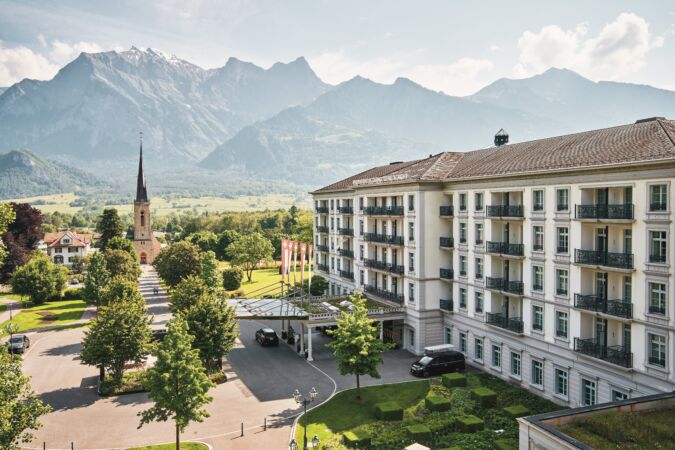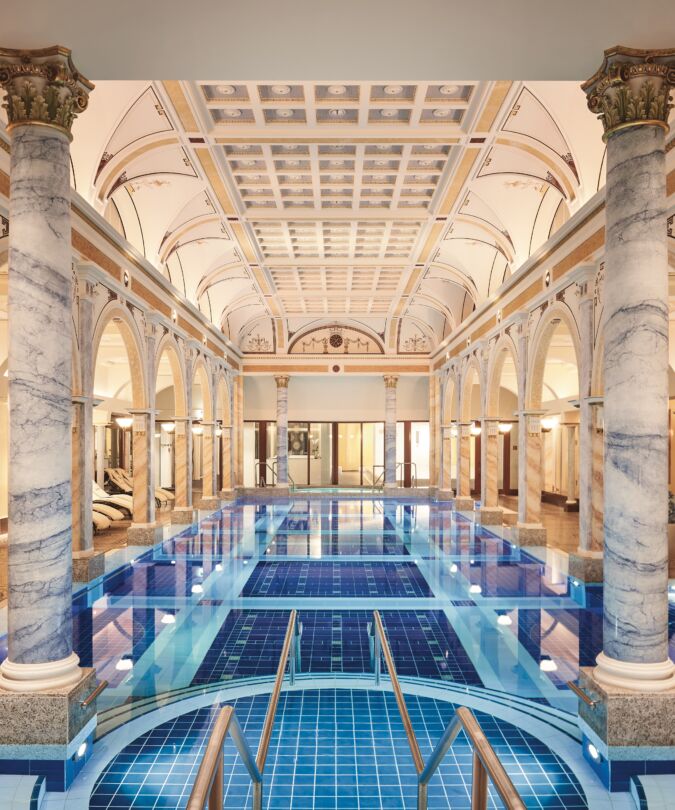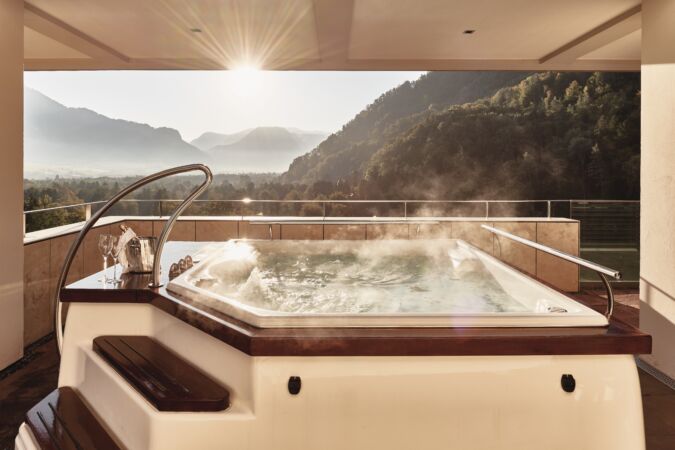It is the elixir of life, yet water is often undervalued or even ignored by those poring over a menu or wine list. The perils of dehydration are well known but how we remain hydrated can be a binary afterthought, reduced to the question of ‘still or sparkling?’ Sustainable, filtered water is now available in many restaurants, though there’s usually scant attention to its source.
All this matters more than you might think, for waters are not born equal: there can be a dramatic difference in their character and mineral content, not to mention the impact on a meal. So, how refreshing to find a place where water is – literally – its raison d’être.
Close to the source of an alpine spring, discovered in the 13th century, Grand Resort Bad Ragaz, near St Gallen, has thermal water at its heart, after a journey of more than a decade through the mineral-rich strata of the Swiss Alps. Having long attracted bathers, seeking its healing effects on the body, its waters are also sought after by those wanting to consume what they call ‘blue gold’.

Water is a serious business for this magnificent five-star spa hotel (a combination of different properties, now gracefully merged into one), to the extent that it employs three qualified water sommeliers across the teams of its trio of multi-Michelin-starred restaurants, two of which are led by chef, Sven Wassmer, celebrated for his reinvention of Alpine cuisine.
Set at the edge of an historic spa town, the resort features a clinic alongside its thermal pools, steam rooms, saunas and massage suites, so bathrobes are de rigueur here, even for those taking a stroll on its manicured lawns. In fact, aside from dinner, you could probably spend the entire day wafting around in crisp white dressing gown and fluffy slippers, though there are plenty of distractions that effortlessly meld luxury with a sense of wellness.

Thermal bathing is arguably the apotheosis of relaxation but time spent in the water should be limited, as it can be surprisingly enervating. Keeping hydrated is key but, as anyone who has sipped from the fountain at Bath’s Roman pools will know, thermal water is very much an acquired taste. At Bad Ragaz, it is a different story because its own water, offered at body temperature, 36.5 degrees celsius (for ease of absorption) tastes delicious.

So what constitutes drinking pleasure when it comes to something seemingly so simple? I can bore for Britain on mineral water and biannually take the car to France for a ‘booze-free cruise’ to stock up on its delicious aqueous offerings, including my beloved Badoit (sadly hard to find in Britain, since Brexit). So I was excited to find the hotel offers complimentary guided tastings for guests, highlighting the diversity of different waters, including its own.

The water tasting
As someone privileged to attend regular wine tastings, I confess that there was something slightly surreal, dare I say underwhelming, about an event centred on four tumblers of crystal clear, still water. Some of my fellow guests also seemed gently bemused as our tasting, led by certified water sommelier, Anke Scherer, began with a briefing.
Water is heavily regulated, we learn, with some important definitions: ‘mineral water’ contains minerals or other dissolved substances that influence how it tastes or give it a therapeutic quality. Subject to rigorous testing, these waters must originate from a natural, protected, specific underground source, at which it must be bottled. ‘Spring water’ is broadly similar, in terms of purity, without the same stipulations for mineral content. ‘Thermal water’ will probably have mineral content but is also defined by the temperature (at least 20 degrees celsius) at which it comes from the earth, while ‘table water’ could be purified or merely from the tap. Sparkling mineral water is usually carbonated with carbon dioxide but can have a natural petillance; a fizz emanating from dissolved volcanic gases.
A still water with a lower mineral content is said to be preferable for most foods
Tasting blind, we assessed the first glass. Unlike wine, nosing was not important but as for what happened on the palate: well… it tasted like a simple glass of water. So far, so unremarkable but then we sampled the second glass, decidedly different, faintly creamy, perceptibly mineral and far more satisfying. Glass three offered even more of that mineral character without being as rounded, nor complete. Then, there was the shock of glass four, which tasted suspiciously like a Victorian treatment for anaemia might have done.
So what’s behind this remarkable difference? Pun intended, it all boils down to mineral content: as the respective samples are unmasked, we learn that the first was Valser, a popular Swiss water with a very low mineral content of 220mg per litre (mg/l); the second – my favourite – was the hotel’s own thermal water, with 441mg/l (considered relatively low); the third was Appenzeller, with a mineral content of 552mg/l; while the fourth water, Eptinger Blau, from one of the deepest springs in Europe, in the mountains of Jura, weighed in at a whopping 2,255mg/l.
As for pairing, as a rule of thumb, a still water – such as that bubbling up in Bad Ragaz – with a lower mineral content, is said to be preferable for most foods and the least likely to adversely impact enjoyment of a wine. However, such has been the popularity of its own thermal water, when tasted alongside commercial rivals, that the hotel hopes to develop gentle carbonation to offer still or sparkling, while potentially banishing bottles and burnishing its sustainability credentials.

‘We are so fortunate to have the water we do in Switzerland, so it needs to enjoy the respect we afford to everything else,’ says Amanda Wassmer Bulgin, wine director at the Grand Resort Bad Ragaz. ‘As soon as you walk into Memories (husband Sven Massmer’s three-star restaurant), we sit you down for little stone cup of our thermal water, just to ground you again, as one of the natural streams flows under the restaurant. It is actually quite an emotional thing to have your own source of water.’








